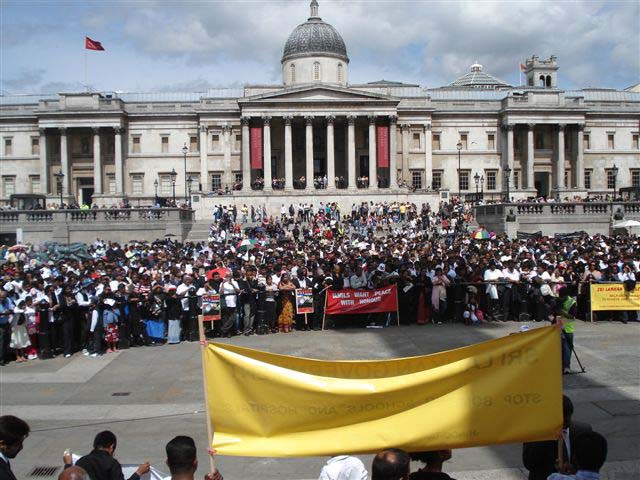Anger and condolences pour in from TamilNadu
Leaders of major political parties in TamilNadu, India, including the ruling party, expressed their deep sorrow and paid tribute to Brigadier S. P. Thamilselvan, who was killed in an air raid on November 2.
In what is seen as a significant gesture, the Tamil Nadu Chief Minister and veteran leader of Tamils, M. Karunanidhi, paid tribute to the slain Liberation Tigers commander.
Kalaignar Karunanidhi, quite typical of his style, used the medium of poetry and pun to pass a subtle message that the Tamils of Sri Lanka haven't gone brotherless.
The Chief Minister's emotion-filled condolence gains significance in the background of a prevailing impression that the government of India is fully backing the war efforts of the government of Sri Lanka aiming for a military solution to the ethnic crisis in the island.
According to media reports for quite some time, the government of Sri Lanka was pressing the Indian government with a long list of sophisticated weapons for air combat.
It is speculated that advanced technology was put in use in the pinpoint bombing of the residence of the members of the political division of the LTTE, which claimed the life of their Political Head Brigadier S.P. Thamilchelvan, on Friday.
Mr. Karunanidhi has been an opponent to military option to resolve the Tamil ethnic question in Sri Lanka.
In March 1990, when the IPKF was withdrawn from Sri Lanka, Mr. Karunanidhi, who was then Chief Minister of Tamil Nadu, refused to attend the reception of the returning troops in Madras.
The veteran Tamil leader paid homage to the former LTTE political head by describing him as a man with an ever-smiling face but a heart that could annihilate the opposition.
Though young he had the strength of the Himalayas and was molded in the way of LTTE political ideologue Anton Balasingam, the poem said.
“The virtuous youth whom with determination offered himself to the War for Rights – his soul hasn't gone extinguished, he hasn't gone brotherless”.
“A beloved son who wrote his fame all over the earth, wherever Tamils live –Selva where have you gone?” the poem further read.
Dr Ramadoss, leader of Paattali Makkal Katchi (PMK) which is in the ruling coalition, said the news of the killing of Brig. Tamilselvan has shocked Tamils around the world, in a statement released on Saturday.
Describing the killing as an attack against peace and human rights, the PMK leader said humanity will not forgive the war mongering Sri Lankan government’s racist act.
“Through the heinous assassination of Tamilselvan, the Sri Lankan government has clearly demonstrated its non-commitment to peace and its intention of wiping out the Tamil race from the island.”
He further said people of Tamil Nadu – who share the ethinicity, language and culture with Sri Lankan Tamils – should no longer be spectators to the suffering of Eelam Tamils.
K. Veeramani, the leader of Dravidar Kazhagam, said the demise of Tamilselvan at a time when the struggle for independence by the Eelam Tamils is reaching decisive stage brings great sadness.
Expressing his sympathies to LTTE leader Velupillai Pirapaharan, the LTTE and Eelam Tamils, Veeramani added that whilst these battle front losses are painful, Tamils around the world should show their solidarity to continue the struggle to realize the dreams of these fallen heroes.
D. Pandian, the Tamil Nadu State secretary of the Communist Party of India (CPI), described Tamilselvan as a person who fought for the fundamental rights of the Tamils in Sri Lanka and worked towards resolving the ethnic conflict through negotiations, in a condolence message.
CPI expressed its condolences to Tamilselvan’s family and described him as a man who gave his life for the Tamil peoples fight for rights.
The party also condemned the Sri Lankan government’s approach of solving the ethnic conflict through military might and intention of annihilating the Tamils
The Periyar Dravida Kazhagam held several commemoration meetings in Tamil Nadu to show respect to Tamilselvan. A commemoration meeting was held at the Boss stadium in Salem, where hundreds of Tamils took part to express their respect to Brigadier Tamilselvan.
The mourners chanted slogans and carried black flags, seeking condemnation of the Sri Lankan government for targeting peace activists and urging immediate action from the Indian government.
V. Gopalsamy (Vaiko), the general secretary of Marumalarchi Dravida Munnetra Kazhagam, described the demise of Tamilselvan as a great loss to the Eelam Tamils.
The air attack showed that the Sri Lanka Government had no faith in resolving the ethnic issue through negotiations, he said.
Desiya Murpokku Dravida Kazhagam president Vijayakant also condemned the attack and expressed his condolences at the death of Tamilselvan.

